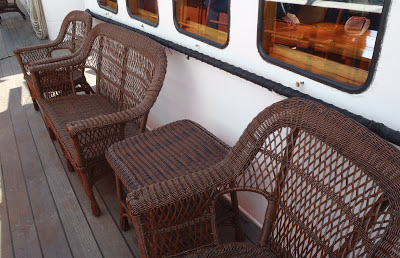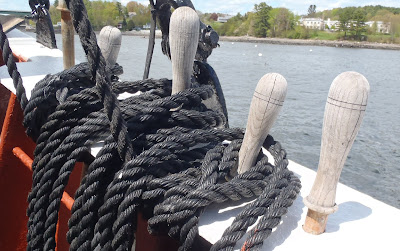Eight paddles, five from beside our door and three from the back of our car.
Going from from top to bottom, 8 quick quick reviews, and three thoughts on spare paddle selection:
Northern Lights Paddle: Mark purchased this three piece fiberglass GP to use on distant trips. It's main benefit is that it fits into an airplane regulation sized bag. It's also light and it handles well, but there may be some leakage at one joint. It's expensive enough that he doesn't often use it around here.
Werner Adjustable 230. We have a series of Werners (yes, we actually have more paddles than shown here.) This has a nicely-locking ferule, locking in 15 degree increments.
But, its not as flexible as paddles which allow length and angle variation. It saw use before I purchased the Bending Branches, and then, as the Bending Branches aged, use again. But I'd like it to be a little shorter, and prefer the Bending Branches shape. This now spends most of its life as a spare.
Mark-made red cedar GP with a take apart ferule.
The ferule was purchased from Chesapeake Light Craft. It spends most of its life as a spare paddle.
Boreal Design Aloonaq 230. Our newest paddle.
Greenland paddles dump water over your hands with every stroke, which is tough on Mark in the winter. This paddle, a very low-area Euro paddle, which may not be made anymore, will probably be his winter paddle. He likes it because it is light and stiff and feels a lot like a Greenland paddle (but is drier - drip rings!) - but it's not as quiet as his GPs. Now, where GPs shine is heading into wind. They are wonderful on windy days. And this paddle does well in wind too. I took it out earlier this month heading into a south wind of a steady 20 knots with gusts to 32. Going upwind, I felt like I'd found the low gear on a mountain bike. It was just incredible. I went upwind about a mile, by which time my top finger joints were beginning to complain.
The shaft has wide spots to help with hand grip, but the edges are sharp. I'm sure my finger pads would callus eventually, but I'm not really looking for thick finger pads. The paddle also did well going downwind, I never felt like the waves were out-powering my stroke.
Bending Branches Adjustable Angle and Length 225-240 Evening Breeze blade.
I've put thousands of miles on this paddle. I love the shape of the blade, and how light it is. But, if you're out in rugged conditions this is not the paddle for you. The ferrule cam does not hold consistently.
Obviously, it holds most of the time. I sometimes think the designers felt the user would find the perfect position for the paddle and just keep it there. But I don't. I use a longer, flatter, paddle on lazy paddles, a shorter, more steeply feathered, paddle in strong winds or heading upstream in fast moving water. The locking mechanism for this paddle sometimes takes dozens of tries to catch. Sometimes it refuses to catch at all. And a few times, when rolling, or paddling hard it has slipped.
Bending Branches sent us a new locking cam shortly after we purchased the paddle. As that lock ran into trouble we've added tape to it's joint to make it less likely to slip.
But, as it's gotten older it slips more and more. The duct tape on the other section is what Mark used to assure it would stay in position when he was using it last winter. This paddle doesn't get to visit the ocean any more.
Epic Paddle, Greg Barton Signature series, Relaxed Tour Blade Adjustable Angle and Length, 215-225. (Purchased at a discount because it was a second quality)
 |
| Elic Paddle, blending with a winter sky |
Look at that locking mechanism! It's wonderful, easy to use, and thus far, no slippage when locked. And this paddle is ever so light. Mark doesn't care for the slick handle, but with my tender hands, the shaft feels perfect. The blade is a little large, it takes a little more to power it through the water. But this has become my main paddle.
Mark-made Cedar paddle. Mark has made quite a few of these, customizing a bit more with each iteration. This is his main cedar paddle, light, but strong.
Mark-made Ash paddle: Four pounds, that's all I need to know. But Mark claims that once the paddle gets moving, it just keeps going on its own. And you can't beat it for fending off polar bears.
Three Thoughts about Spare Paddle Selection:
One: Anything will do. We use this philosophy on our river kayaks. We rarely take those more than three miles from our home. How bad could using a crappy paddle be if you're just going three miles? We have some pretty poor paddles as spares on the river kayaks. One is a paddle which washed up on shore, the other is an older, heavier, paddle.
Two: They need to be as good as your main paddle. We have used this on our travel kayaks, starting after a thirteen mile paddle where Mark's GP snapped as he was getting into his kayak. Paddles don't break often, but if they do, do you want your trip ruined? Get a spare as close to your favorite as you can.
Three: Use a spare to change up things during the trip. Mark does this sometimes, taking his GP but carrying a Euro paddle spare to deal with patches of fast moving current. And ever since that windy afternoon with the Boreal Design, this has seemed more appealing to me. If the wind picked up unexpectedly, it would be so nice to take a break and use the Aloonaq, even just for a mile or two. .








































